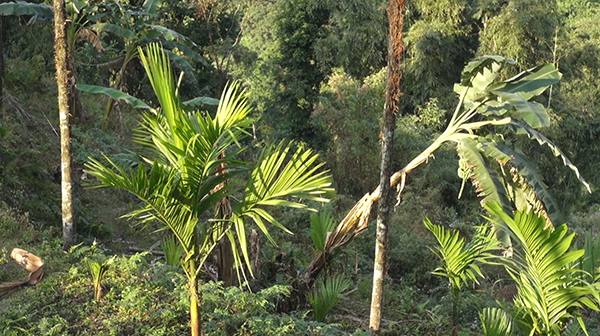 The locals of Pemaling Gewog in Samtse are asking relevant authorities to put an end to the long-standing human-elephant conflict. This is following the recent incident where an elephant stamped on and killed an elderly woman in the gewog.
The locals of Pemaling Gewog in Samtse are asking relevant authorities to put an end to the long-standing human-elephant conflict. This is following the recent incident where an elephant stamped on and killed an elderly woman in the gewog.
At Manigang_Tashithang, one of the farthest chiwogs in Pemaling gewog, the Gautam family is performing final rites for their deceased mother. The 69-year-old Tika Maya Gautam was killed in the early hours of December 5th by an elephant.
“The elephant came through this way. He was near that tree. My mother was praying to the elephant to go its way. We thought the elephant would go away. We ran inside. I think the elephant didn’t know where to go, kept running towards my mother and stamped her to death,” said Rup Narayan Gautam, the deceased’s son.
This is not the first incident where an elephant has taken a human life. Tashichhoeling Drungkhag alone has recorded 10 such incidents.
“We can’t do anything to the elephant. We can’t beat them, scold them nor shout at them. If we hurt them, we will be penalized. But when elephants cause such harm to humans, destroying crops and today killing people, what do we do? It is such a sad situation,” said Khem Prasad Sharma.
People say enough reporting and damage assessments have been done and that it’s time to see concrete interventions to prevent such mishaps. So far, the crops destroyed by elephants and human lives lost in the conflict have not been compensated.
“Reports are made and presented every time but we don’t get any response. It is very disheartening. Our farmers work very hard but when it comes to harvesting the yield, wild animals destroy it. We report the damage but once the report is done, there are no follow-ups from the relevant agencies,” said Mangmi Sangay Penjor.
The Gewog Elephant Conservation Committee, which was dissolved last year, ensured some compensation to the aggrieved farmers. The government provided Nu 500, 000 as seed money with farmers contributing Nu 500 annually to the committee.
“We cannot offer any other forms of support. When people come to us complaining of wild animals destroying their crops, we can only give them seeds and nothing else. We have set aside a budget for seeds,” said Gup Khem Raj Ghalley.
The forest range office in Tashichhoeling keeps a record of all human-wildlife conflict incidences. But they are limited to only writing reports and do nothing when it comes to paying compensations.
Sherub Dorji






